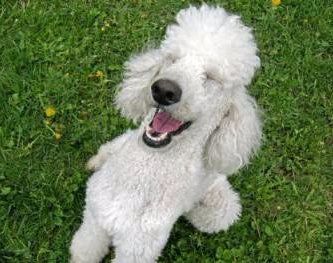Poodle Behavior

Overview
This section will go over common Poodle behavior and what to expect with your Toy, Miniature or Standard. Poodles are amazing canines, capable of
high intelligence, strong loyalty and having a range of emotions. Just like people, Poodles can feel sad, depressed, excited, happy, bored, overwhelmed...even jealous.
The Poodle is known for being one of the most intelligent dog breeds in the world (within the top 5) with a unique temperament. Being so elegant, particularly the show dog, many people do not realize just how friendly and "people orientated" a pet Poodle is. They love human companionship, love to play and are truly a fantastic canine family member.
Along with each Poodle having their own unique personality, owners find that their Poodle can also have some odd or particular habits or behaviors. Let's take a look at some of the behaviors of this breed and whether one should be concerned... or just chalk it up to the individuality.
Sleep
Puppies - Poodle puppies up the age of 8 months can sleep anywhere from 15 to 20 hours per day! Their sleeping needs will decrease with age. With puppies, it is very normal to sleep quite a bit and to be extremely active while awake.
Adolescent & Adult Poodles - Poodles, usually after the age
of 1 year, will sleep approximately 13 hours and by this age most dog's learn to adjust their sleeping hours to be in conjunction with their owner's schedule. It is normal for Poodles to take naps. Dogs that are left home alone during the day for more than 3 hours will usually take many more naps than ones that have companionship during the day.
Senior Poodles - Senior dogs will sleep more often and naps will increase as the dog grows older. A Toy Poodle is considered to be a senior at the age of 10, a Miniature Poodle at the age of 8-9 years and a Standard Poodle at 7 years old. It is important to allow an older dog to take naps whenever they wish and not to "push" playing or exercise on them. While daily walks
are still very important to health, do allow a senior to rest when needed.
Most Common Behaviors Seen
There are many stages that a Poodle puppy enters during this fast time of growth and development. Some stages happen so fast, you can see your Poodle changing right before your eyes! Other behaviors can be present for the dog's entire life... and bad habits can stay indefinitely if training is not implemented. Let's take a look at what is normal behavior for a Poodle puppy , adolescent and adult dog... and some ways to deal with these phases.
The Hyper Poodle Puppy -
This phase will last from 8 weeks to approximately 1 year. It will be normal for your puppy to have an abundance of energy! Poodle puppies will want to play from daybreak to nightfall. It is normal for a pup to run around the home, investigate every object they can get their mouths on and generally wear you out! Do keep in mind that a puppy will want to chew on everything, well before teething even begins. Be sure to puppy proof the house can use firm training if your Poodle is not listening to commands. Read more about how to help a hyper Poodle.
The Clingy Poodle
- Some Poodles can be rather shy and may wish to stay very close to an owners as opposed to venturing out even a bit to interact with others or to independently play. Over time, this can be wearing on owners and does not allow the dog to have a quality life that is full with exploration and self-confidence. Read more about what to do if a Poodle is clingy.
Poodles that Don't Do Well When Home Alone -
While it is much more common with puppies, a Poodle of any age may become excited very easily. This can be negative or positive. Some Poodles have Separation Anxiety, a term used when a dog has a difficult time coping with being home alone. Dogs who feel this way may become so happy when their owners return home that they loose control of their bladder. Since we can't be with our Poodles every moment (although we wish we could), you may wish to read the separation anxiety section.
The Chewing Machine -
As mentioned above, puppies have an almost uncontrollable instinct to chew on everything that they can find. This is actually a very important stage, as it is a learning stage. An owner must keep the home "puppy proofed", however at the same time one must allow a puppy to explore their world, both inside and outside of the home. When teething begins, this can be an especially trying time. You may wish to read more about this in the teething section.
Nipping -
Nipping can become a bad habit, if training is not given to show a Poodle that nipping is not acceptable. This can interfere with many aspects, including having your dog behave when company comes over or when your dog is playing with children. Puppies naturally nip because this is the 1st form of play that a puppy learns. It will be the owners job to show their Poodle was is and what is not acceptable so that you do not have a nipping adult dog! You may wish to read more in the temperament section.
Jumping on People
- This comes from a good place, a Poodle that jumps up to say hello just has a lot of enthusiasm in their greetings. But, this can quickly become frustrating behavior. Read how to allow your Poodle to release pent up energy and learn self control when saying hello: When a Poodle Jumps on People.
Growling -
This can be done in play (mostly with puppies) but can also be an aggressive growling that may be due to the Poodle mistaking his/her place in the hierarchy of the home. It's important to deal with this sort of behavior at the onset to correct things quickly. Learn more in the Poodle Growling
section .
Marking -
Marking is different than having housebreaking accidents. With this, a Poodle will spray urine in the house to mark his or her territory. And the reasons behind this can be triggering very strong canine instincts.
Fortunately, there are ways to stop a Poodle from marking, by using a combination of establishing proper hierarchy and responding to this in the right way.
Coprophagia
- Commonly known as eating feces, this is a disturbing behavior that is not uncommon with all varieties of Poodles. A dog may ingest his own poop, that of another dog or even cat feces from the litter box. Learn what can prompt a puppy or dog to do this and steps you can take to stop this.
Begging
- Dogs that have learned the art of begging can be relentless. If you find yourself giving in, these tips to stop a Poodle from begging
can stop this behavior and lead to less stress for both you and your puppy or dog.
Disobedience
- Poodles can have independent streaks and if care is not taken to teach rules and guidelines, there can be issues with no obeying. Read how to address a Poodle that won't listen
to turn things around.
See also: Chewing and Licking at Paws - There are several route causes for this. Read how to limit this and at-home remedies to stop itching and possible inflammation.
Poodle is humping a lot
- This sort of behavior can come from Poodles of any age and even from those that are fixed. Why a dog does this and helpful advice regarding how to stop a Poodle from doing this.
